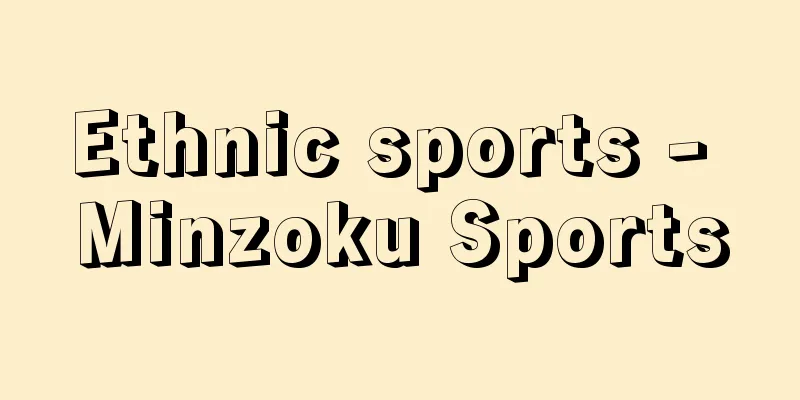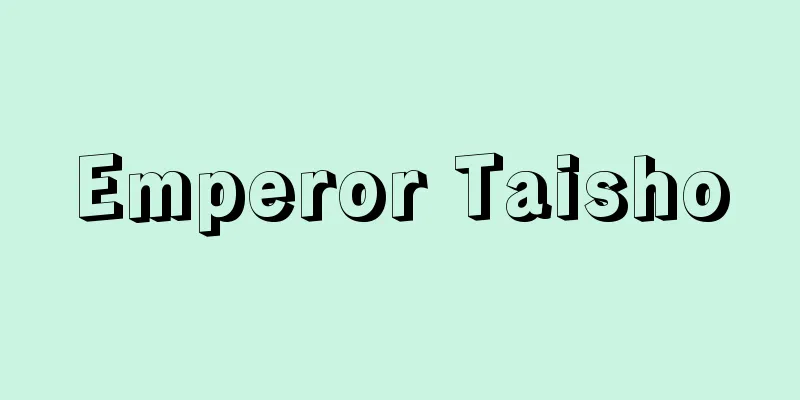Ethnic sports - Minzoku Sports

|
A sport that has been handed down for a long time among a certain ethnic group or in a certain region. Moreover, it means a sport that is deeply connected to the indigenous (vernacular) culture and cosmology unique to each ethnic group or region. It is the same term as ethnic costumes, ethnic dances, ethnic music, and ethnic cuisine. In particular, ethnic sports seem to strongly reflect indigenous religions (beliefs), livelihoods (climate and environment), and combat styles. Therefore, although some sports are very similar in terms of physical form, each ethnic sport is different in terms of its spirituality or culture, and has its own uniqueness and originality. For example, there is a wide distribution of ethnic groups that play tug-of-war as their ethnic sport, and although they share many common elements, strictly speaking, each one is different. Ethnic sports are extremely diverse, including those used by the Inuit (Eskimo) for weather divination, by the Ainu as part of bear festivals, by the Itelmen people of the Kamchatka Peninsula to confirm seasonal changes, as a fertility ritual among grain-growing peoples in Southeast Asia, by the Berber peoples of North Africa to pray for rain, and in Japan as a water god ritual that focuses on dragons and snakes. Sumo and wrestling-type combat sports are also widely distributed as ethnic sports, but like tug-of-war, their characteristics also differ subtly depending on the region and ethnic group. Some ethnic sports have been modernized and internationalized, becoming modern sports, forming the center of today's sports culture, such as the modern Olympic Games and the FIFA World Cup, but at the same time, they are still closed off in their indigenous (vernacular) nature and maintaining their function as a cultural device for forming the unique ethnicity of each ethnic group, forming, so to speak, the periphery of today's sports culture. Recently, there has been a great deal of interest in the very existence of ethnic sports, but research and studies on them have only just begun. According to the results of such research, in recent years, ethnic sports competitions have been held with the aim of confirming the ethnicity unique to each ethnic group. Examples include the Basque Ethnic Sports Competition in the Basque Country in Spain, the World Eskimo Indian Olympics in Alaska, and the Highland Games in Scotland. There are countless small-scale ethnic sports competitions like this. In Japan, on Horse Day (September 23rd) every year, horse folk sports from all over the country are displayed at the Baji Koen in Setagaya, Tokyo. Source : Heibonsha Encyclopedia About MyPedia Information |
|
ある特定の民族の間に,あるいはある特定の地域に古くから伝承されているスポーツのこと。しかも,それぞれの民族や地域に固有の,土着(バナキュラーvernacular)の文化やコスモロジーと深く結びついているスポーツを意味する。民族衣装,民族舞踊,民族音楽,民族料理などと同じ語法。とりわけ,民族スポーツは土着の宗教(信仰)や生業形態(気候・風土),および戦闘形態を色濃く反映しているように思われる。したがって,運動形態としてはよく似ているものもあるが,その精神性,あるいは文化性という点では,個々の民族スポーツごとに異なっており,特異性・独自性を持っている。 たとえば,綱引きを民族スポーツとして行っている民族はかなりの分布を示しており,多くの点で共通する要素をもっているが,厳密にいえば,一つひとつ異なるものである。イヌイット(エスキモー)では天候占いのために,アイヌは熊祭の一環として,カムチャツカ半島のイテリメン族は季節の変化を確認するために,東南アジアの穀物栽培民の間では豊穣儀礼として,北アフリカのベルベル族では降雨祈願のために,あるいは,日本では竜や蛇を意識した水神儀礼として行われたり,まことにバラエティに富んでいる。 相撲・レスリング系の格闘技も民族スポーツとして広い分布を示すが,これらもまた綱引き同様,各地域や民族によって微妙にその性格を異にする。民族スポーツは,その一部が近代化をはたして国際化し,それらが近代スポーツとなって,近代オリンピック競技大会やサッカー・ワールドカップのように,今日のスポーツ文化の中心を形成していると同時に,いまだ土着性(バナキュラー性)のなかに閉じこもって,民族固有のエスニシティethnicityを形成する文化装置としての機能を固持しており,いわば,今日のスポーツ文化の周縁を形成しているのである。 最近になって,民族スポーツの存在そのものに高い関心が寄せられるようになってきたが,それらの調査・研究という点ではまだ始まったばかりである。それらの成果によると,近年では,民族固有のエスニシティの確認を意識した民族スポーツ大会が開かれるようになってきているという。たとえば,スペイン・バスク地方のバスク民族スポーツ大会,アラスカのワールド・エスキモー・インディアン・オリンピック,スコットランドのハイランド・ゲームなどがある。これらの小規模の民族スポーツ大会は無数にあるといってよい。日本でも,〈馬の日〉(9月23日)には東京・世田谷の馬事公苑で,毎年,全国各地に伝承されている馬の民俗スポーツが披露されている。
出典 株式会社平凡社百科事典マイペディアについて 情報 |
<<: Great Migration - Völkerwanderung (German: Great Migration)
Recommend
Flower Whale - Shadow
〘Noun〙 ("Hana" is a flattering name, and...
Illustrated Guide to Famous Places in Owari
...Inspired by Yoshinoya Tamehachi's plan and...
Dravidian languages
It is a language family with an ancient and rich ...
National Institute of Spiritual Culture
In 1932, the Ministry of Education established the...
Leopold I (Holy Roman Emperor)
…But in Austria, the imperial throne that remaine...
Fan Kuai
A meritorious vassal of Emperor Gaozu Liu Bang of...
Aoyama Tadatomo
1708-1760 A daimyo in the mid-Edo period. Born on...
Clark, EB (English spelling) ClarkEB
...This caused the collapse of the "spirit o...
Nalanda - Nalanda (English spelling)
This is the remains of a famous temple of learnin...
Ambon people
...The highest point of the volcanic island is Mo...
Echigo Plain - Echigo Heiya
Occupying the central part of Niigata Prefecture,...
Sloaga
Spanish painter. Born in Guipúzcoa province in the...
Syrian-Canaanite mythology - Syrian-Canaanite mythology
In recent years, Near Eastern archaeology has prov...
Hancock, T.
…Starting out uneducated, Goodyear devoted himsel...
Müller, Johannes (English spelling) Muller Johannes
…However, H. Goltzius of Haarlem further increase...


![Hanazono [town] - Hanazono](/upload/images/67cc8a9d79666.webp)






